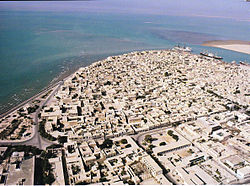Boushehr
|
Bushehr بوشهر |
|
|---|---|
| city | |

Persian Gulf Coast in Bushehr
|
|
| Coordinates: 28°58′N 50°50′E / 28.967°N 50.833°ECoordinates: 28°58′N 50°50′E / 28.967°N 50.833°E | |
| Country |
|
| Province | Bushehr |
| County | Bushehr |
| Bakhsh | Central |
| Elevation | 8 m (26 ft) |
| Population (2016) | |
| • city | 273,577 |
| • Metro | 298,581 |
| census | |
| Time zone | IRST (UTC+3:30) |
| • Summer (DST) | IRDT (UTC+4:30) |
| Website | www.bushehrcity.ir |
Bushehr or Bushire ![]() pronunciation [buːˈʃeɾ] (Persian: بوشهر; also Romanized as Būshehr, Bouchehr, Buschir, and Busehr; also Bandar Bushehr (Persian: بندر بوشهر), also Romanized as Bandar Būshehr and Bandar-e Būshehr; previously known as Beh Ardasher, Antiochia in Persis (Greek: Αντιόχεια της Περσίδος) and Bukht Ardashir, is the capital city of Bushehr Province, Iran. At the 2006 census, its population was 161,674, in 40,771 families.
pronunciation [buːˈʃeɾ] (Persian: بوشهر; also Romanized as Būshehr, Bouchehr, Buschir, and Busehr; also Bandar Bushehr (Persian: بندر بوشهر), also Romanized as Bandar Būshehr and Bandar-e Būshehr; previously known as Beh Ardasher, Antiochia in Persis (Greek: Αντιόχεια της Περσίδος) and Bukht Ardashir, is the capital city of Bushehr Province, Iran. At the 2006 census, its population was 161,674, in 40,771 families.
Bushehr lies in a vast plain running along the coastal region on the Persian Gulf coast of south-western Iran, it is built near the ancient port city of Rishahr/Reshire (Sassanian, Riv Ardasher). It was the chief seaport of the country and is the administrative centre of its province. Its location is about 1,218 kilometres (757 mi) south of Tehran. The local climate is humid.
Bushehr was the main trade center of Iran in the past centuries. The city structures are traditional in style, modest in proportion and cost. Due to its lack of rail connection to the interior of the country and its shallow anchorage, it has lost its position as the primary port of Iran.
To the south of the present city, at Reeshire, are the remains of an earlier Elamite (c 3000 BCE) settlement. During the Greek Macedonian Seleucid dynasty the city was refounded as Antiochia in Persis (Αντιόχεια της Περσίδος) by Seleucus Nicator. A few decades later the city was rebuilt by Seleucus's son Antiochus who transferred there colonists from Magnesia. Also the Seleucid king Antiochus stayed there for a while in 205 B.C. after his campaign to the eastern provinces (212 -205 B.C.). Antiochia remained under Greek Seleucid rule until circa 170 B.C. It was one of the most important ports of the Sasanian navy and was named after the first king of this dynasty, Ardashir I.
...
Wikipedia

